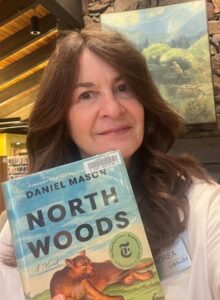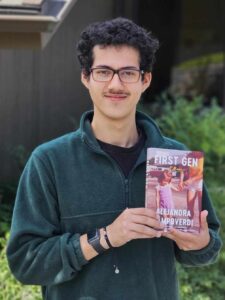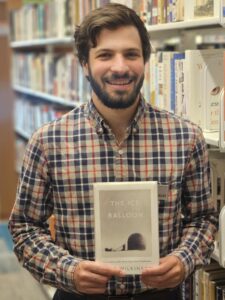August-November 2024Library Foyer The Community Library featured a Foyer exhibit that displayed objects collected from the gravesite of Ernest Hemingway, the Nobel and Pulitzer Prize-winning author. Hemingway died by his own hand in 1961 in his home in Ketchum, Idaho.* He was buried in the Ketchum Cemetery and his funeral ceremony was attended by close friends and family. Curated by prominent Broadway director Les Waters, Hemingway's Grave: A Year of Offerings, brought together select … [Read more...] about Hemingway’s Grave: A Year of Offerings
Library Blog
Book Review: Moonwalking with Einstein
Collections Manager Aly Wepplo recommends Moonwalking with Einstein: The Art and Science of Remembering Everything by Joshua Foer. In August, I performed in Laughingstock Theater’s production Much Ado About Nothing by William Shakespeare. For that job, I memorized a script of about 100 pages – no small feat! And I remembered that memorization is an amazing thing. It is both a game and a challenge. And it is the topic of the book Moonwalking with Einstein: The Art and Science of … [Read more...] about Book Review: Moonwalking with Einstein
Book Review: North Woods
Librarian Andrea Nelson recommends North Woods by Daniel Mason. …And now for something completely different.~Monty Python’s Flying Circus, 1971 It’s difficult to capture the essence of Daniel Mason’s North Woods in a single book review. Never before have I read a book as impossible to pigeonhole as this brilliant, multi centennial saga inspired by the crumbling stone remains of a long-gone New England house. When North Woods arrived at our library in 2023, the first thing … [Read more...] about Book Review: North Woods
Book Review: First Gen
Programs and Communications Intern Juan Reyes recommends First Gen: A Memoir by Alejandra Campoverdi. First Gen: A Memoir is truly a gift. As a child of Mexican immigrants, to find a book that somehow encapsulates the aspects of what it means to be first-generation has been both eye-opening and reassuring. Her book illustrates her truthful and raw story of what it takes to achieve the “American Dream”, depicting moments of struggles, sacrifices, and even victories in the quest that she … [Read more...] about Book Review: First Gen
Book Review: The Ice Balloon
Regional History Librarian Liam Guthrie recommends The Ice Balloon: S. A. Andrée and the Heroic Age of Arctic Exploration by Alec Wilkinson. As the twentieth century drew to a close, and most of the world had been mapped, nothing captivated the desires of European explorers like Earth’s final frontiers, the Arctic and Antarctic regions. Drawn by scientific inquiry, fame, and the great white expanse, many tried and failed, most often with deadly consequences, to reach the two poles. In … [Read more...] about Book Review: The Ice Balloon
Young Women Fishing at Redfish Lake
Lucy Maitland-Lewis, Wood River Museum of History & Culture Intern 85 years ago, this early Sun Valley publicity photograph was taken as two young women assembled their fishing gear at the edge of their canoe. The horizon is tilted as Louis Holliday likely stood in a nearby boat, but the ladies’ boat is frozen in time, level and still, while Mount Heyburn ascends behind them. Donated to the Center for Regional History by Holliday himself, this photo only measures four by five inches, … [Read more...] about Young Women Fishing at Redfish Lake






